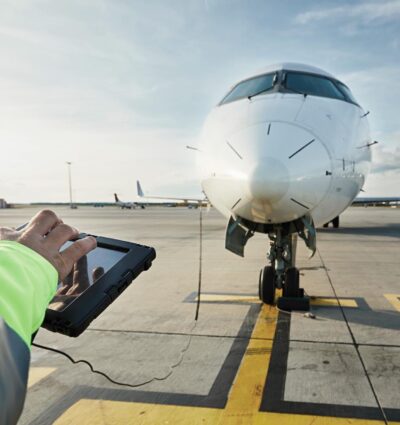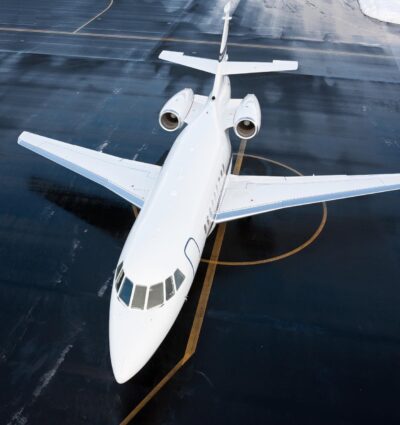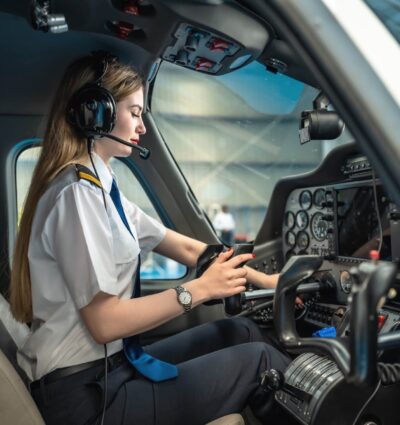
Executive aviation is entering a new era, where artificial intelligence has evolved from a promise for the future to a true engine of transformation in the industry. From route planning to predictive aircraft maintenance, and including personalized services both in the air and on the ground, AI in private aviation offers jet owners, airline executives, and fleet managers new opportunities to reduce costs, increase safety, and elevate the passenger experience to previously unimaginable levels.
Industry leaders are already integrating AI solutions into every stage of the executive travel journey, making it a key ally for strategic decision-making, safeguarding fleet investments, and delivering a unique, personalized, and secure experience to each client.
More accurate flight planning thanks to AI
Flight planning with artificial intelligence has undergone a drastic transformation. AI enables the rapid analysis of multiple variables such as weather conditions, airspace restrictions, and slot availability at congested airports, all in just seconds.
AI-powered tools for route planning optimize flight paths to identify the most efficient and safest options. This results in significant fuel savings, reduced flight times, and fewer delays, all of which directly impact customer satisfaction and help lower operational costs.
Among the most widely used solutions in the industry are platforms like:
- JetNet, which incorporates AI to simplify data management and analysis in the aviation field.
- and Lufthansa’s NetLine, which helps anticipate operational disruptions and restructure flights in response to unexpected situations to maintain punctuality.
This intelligent planning extends beyond the airspace. Travel coordination teams, including personal assistants, operations departments, and aviation brokers, can organize every detail of the journey in advance. Some of the best flight tracking and planning applications now use AI to streamline itineraries more effectively.
For private jet fleets, these technologies offer an immediate advantage; they not only improve operator profitability but also deliver a more punctual, faster, and environmentally friendly service to clients.
Personalized in-flight experiences with intelligent algorithms
Thanks to artificial intelligence, the onboard experience is reaching unprecedented levels. Smart algorithms can automatically adjust lighting, climate control, and even multimedia content based on each passenger’s individual preferences, creating an environment that adapts perfectly to their mood and schedule.


Leading companies like Gulfstream have integrated AI systems that learn from and anticipate their clients’ needs, optimizing comfort throughout the flight. For example, their cabin control system adjusts temperature and lighting according to the passenger’s circadian rhythm, helping to reduce jet lag and enhance rest.
This personalization extends beyond the cabin. AI-powered ground services enable seamless coordination of executive transportation with private chauffeurs, smart baggage handling for private jets, and streamlined access to FBO facilities, on par with the best VIP airport lounges in commercial aviation, elevating the customer experience from the moment they arrive at the terminal.
Intelligent personalization not only boosts passenger satisfaction but also becomes a competitive edge for operators and owners aiming to provide flights that truly match the pace and preferences of their clients.
Predictive maintenance and real-time monitoring
Predictive maintenance is key in private aviation to anticipate failures before they occur. Artificial intelligence for aircraft monitoring analyzes thousands of real-time parameters from engines, hydraulic systems, electrical components, and other critical parts, detecting patterns that may indicate unusual wear or abnormal behavior.
With these AI algorithms designed to prevent technical failures in private jets, operators can schedule maintenance proactively, avoiding unexpected groundings and improving aircraft availability. This not only minimizes downtime but also significantly reduces maintenance costs by preventing major repairs or premature component replacements:
- GE Aviation, for example, uses its Predix platform to gather aircraft data and provide predictive analytics that help schedule maintenance precisely and lower costs.
- Another notable case is Embraer, which uses its AHEAD (Aircraft Health Analysis and Diagnosis) system to monitor the real-time condition of its executive jets, identifying potential issues before they impact operations and automatically sending alerts to maintenance teams.
These solutions help preserve fleet value, ensure constant aircraft availability, and deliver a more reliable and secure service. Additionally, AI is transforming private flight safety by enabling advanced threat analysis, detecting potential vulnerabilities and risks before they affect the itinerary or passenger security.
Automated and efficient customer service
Customer service is another area undergoing this digital transformation. Chatbots and virtual assistants in private aviation simplify everything from the initial booking to managing special services and post-flight support, automating repetitive tasks, and reducing response times from hours to minutes. Powered by natural language processing algorithms, these systems can understand and respond to passenger requests accurately and personally, even anticipating needs based on previous interactions.
Jet.AI has developed CharterGPT, an AI tool for corporate aviation bookings that automates and personalizes the private flight charter process. Using advanced LLM algorithms, it allows clients to manage quotes, select aircraft, and plan complex itineraries via text messages or an app, simplifying the booking experience and providing instant support without sacrificing personalization.
The result of using AI in customer service for private flights is faster, more consistent support that enhances the customer experience and fosters loyalty, crucial in a market where time and personalization are key factors for passengers.
Reducing operating costs through AI
Real-time prediction of the costs for each flight is now possible by considering variables such as fuel consumption, weather conditions, and airspace restrictions. This analytical capability enables operators to adjust planning and make smarter decisions to maximize the efficiency of every flight.

Tools like Honeywell Forge integrate data analysis modules that monitor aircraft performance and recommend adjustments to reduce fuel consumption. Other solutions, such as Boeing’s services, help identify inefficiency patterns in routes and operations, allowing for changes that lower expenses and extend the lifespan of equipment.
The impact of these solutions not only translates into financial efficiency but also into a move towards sustainability, reducing carbon emissions through fuel savings.
A predictive and connected future in executive aviation
The impact of AI on executive aviation is undeniable. The future of private aviation is shaping up as a predictive, connected, and highly personalized ecosystem, driven by the integration of artificial intelligence across most processes. This transformative potential is evident at events like EBACE, where innovations showcasing a more automated, efficient, and sustainable industry are unveiled every year.
Along this path toward operational excellence, AI-driven innovations in airport security also stand out, with technologies capable of analyzing passenger flows, identifying unusual behaviors, and assessing risks in real time, strengthening passenger protection and improving coordination with ground security teams.
In a competitive and demanding market like corporate aviation, the ability to anticipate needs and adapt to client expectations becomes a key differentiator. Operators, owners, and investors who adopt and lead the integration of AI systems for business aviation will not only improve their financial performance but also invest in the sustainability and relevance of their operations, where efficiency, safety, and personalization will be essential requirements.
Frequently Asked Questions about Artificial Intelligence in Private Aviation
What AI tools are used for flight planning in private aviation?
Solutions like Lufthansa Technik’s NetLine, JetNet, and Honeywell Forge’s planning modules use AI to optimize routes by analyzing weather conditions and anticipating slot availability, reducing time and costs.
How does AI improve the passenger experience on private jets?
AI personalizes the onboard experience by adjusting lighting, climate control, catering, and entertainment based on passenger preferences, as Gulfstream does, creating a flight completely tailored to each client.
Which airlines or manufacturers use predictive maintenance with AI?
Manufacturers like Embraer, with its AHEAD system, and Bombardier, with Smart Link Plus, apply AI to analyze the real-time status of their jets, anticipate failures, and optimize maintenance. Additionally, manufacturers like Gulfstream integrate predictive monitoring capabilities into their support programs to improve operational availability and reduce costs for their executive aircraft.
Is AI safe when applied to the management of executive flights?
Yes, as long as it is implemented with certified standards and human supervision. AI does not replace pilots or operations teams but assists them with more accurate data and predictive alerts to enhance safety and decision-making.
Which BizAv companies are leading the digital transformation with AI?
Leaders include XO, Jet.AI, Flexjet, Gulfstream, Embraer, and technology solutions like MySky, which apply AI in bookings, operations, maintenance, and personalization of the onboard experience.